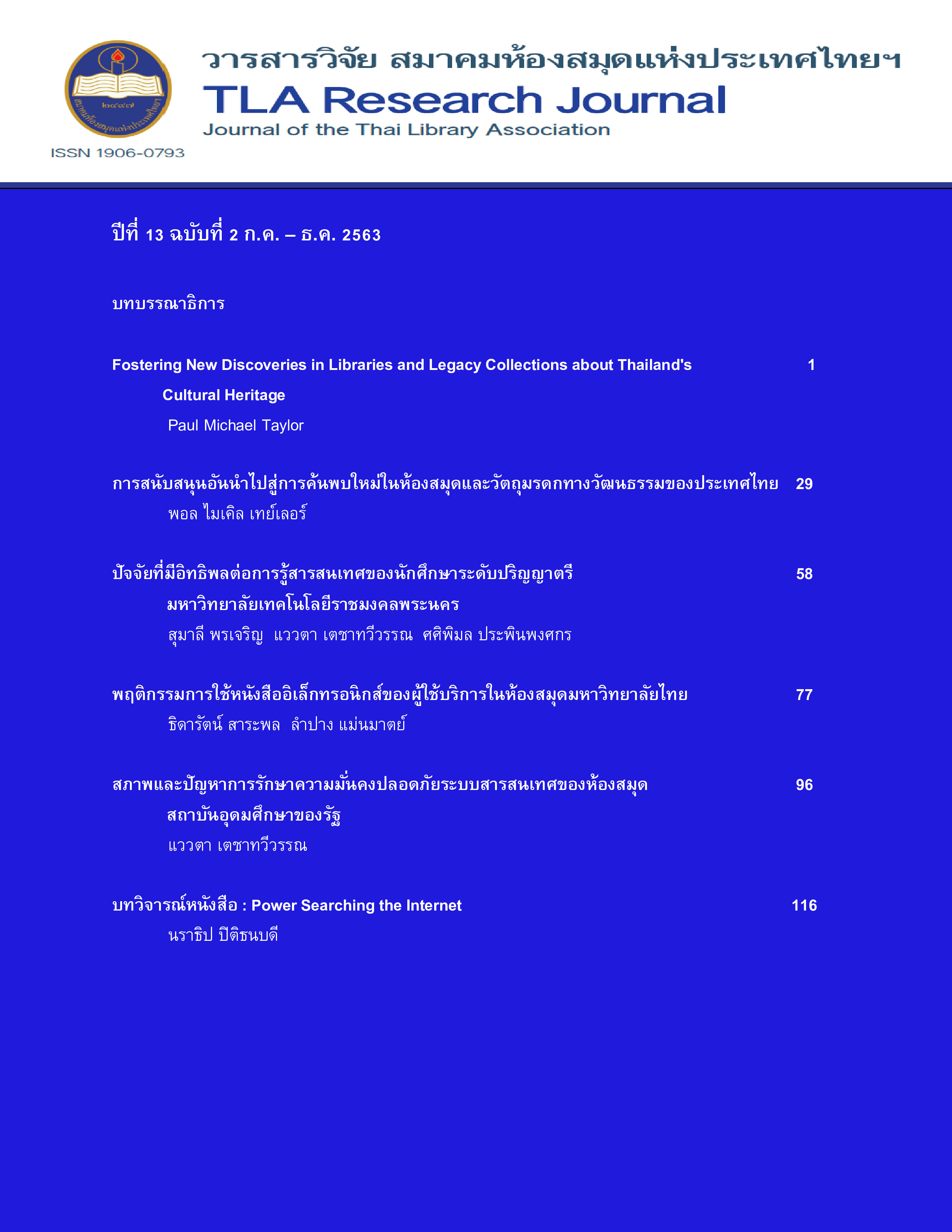E-book usage behavior of users in Thai academic libraries
Main Article Content
Abstract
The objectives of this research were to study the usage behavior of users in Thai academic libraries. Quantitative method was used and data collection was done by purposive sampling with 527 respondents who were lecturers and students from 4 university libraries by questionnaire. Results found that: E-book usage of users of Information sources were search engine while university libraries mostly interdisciplinary e-book database, e-book types was e-textbooks, e-books contents was mostly science and technology, e-book languages was mostly English, searching methods was mostly searching by themselves manually, devices for e-book was mostly smartphone, and e-book formats was mostly pdf file. E-books usage problems found that e-book acquisition at a medium level, e-book storage and organization at a medium level, e-book access and retrieval at a medium level, and e-book promotion at a medium level. E-books requirement found that e-book policy and acquisition at a high level, e-book storage and organization at a high level, e-book access and retrieval at a high level, and e-book services at a high level.
Article Details
บทความทุกเรื่องที่ลงตีพิมพ์จะได้รับการตรวจอ่านโดยผู้ทรงคุณวุฒิ ความคิดเห็นและบทความที่ปรากฏในวารสารนี้ เป็นของผู้เขียนซึ่งมิใช่เป็นความคิดเห็นของคณะผู้จัดทำ และมิใช่ความรับผิดชอบของสมาคมห้องสมุดแห่งประเทศไทยฯ การนำบทความในวารสารนี้ไปตีพิมพ์ซ้ำต้องได้รับอนุญาตจากคณะผู้จัดทำ
All articles submitted for publication will be reviewed by the academic reviewers. The editorial board and TLA claim no responsibility for the content or opinions expressed by the authors of individual articles or columns in this journal. Reprinting of any articles in this journal must be permitted by the editorial board.
References
Bratanek, L.A. (2013). Case study of E-book use in an academic library: A communication perspective. (Master’s thesis). University of Ottawa, Canada.
Carroll, A.J., Corlett-Rivera., K., Hackman. T., & Zou, J. (2016). E-book perceptions and use in STEM and non-STEM disciplines: A comparative follow-up study. Library and the Academy, 16(1). 131-163.
Cassidy, E.D., Martinez, M., & Shen, L. (2012). Not in love, or not in the know? Graduate student and faculty use (and non-use) of E-Books. The Journal of Academic Librarianship, 38(6), 326–332.
Cheek, F.M. & Hartel, L.J. (2012). The electronic book – beginnings to the present. In Kaplan, R. (Ed.), Building and managing e-book collections: A how-to-do-it manual for librarians (pp.3-12). Chicago, IL: Neal-Schuman.
Choorueangsuk, J. (2009). การใช้และความต้องการใช้หนังสืออิเล็กทรอนิกส์: กรณีศึกษาหอสมุดวิทยาศาสตร์สุขภาพ มหาวิทยาลัยสงขลานครินทร์ [Usage and need of electronic books: A case study of Health Science Library Prince of Songkla University]. Songkha: Prince of Songkla University. [in Thai].
Conyers, A., Lambert, J., Wong, L., Jones, H., Bamkin, M. & Dalton, P. (2017). E-book usage: Counting the challenges and opportunities. Insights, 3(2), 23-30.
Dhamuangsri, S. (2007). การใช้ทรัพยากรสารสนเทศอิเล็กทรอนิกส์ของนิสิตระดับบัณฑิตศึกษา มหาวิทยาลัยมหาสารคาม [The use of electronic information resources of graduate students of Maha Sarakham University]. (Master Thesis). Khon Kaen University, Thailand. [in Thai].
Kahn, M. & Underwood, P.G. (2013). Issues related to the adoption of e-books in academic libraries: A literature review. South African Journal of Library and Information Science, 79(2), 10-17.
Kaplan, R. (Ed.). (2012). Building and managing e-book collections: A how-to-do-it manual for librarians. Chicago: Neal-Schuman.
Kumbhar, R. (2018). Trends in E-book research. DESIDOC Journal of Library and Information Technology, 38(3), 162-169.
Library Journal. (2016). EBook usage in U.S. academic libraries 2016. New York: Author.
Mincic-Obradovic. K. (2011). E-books in academic libraries. Oxford: Chandos Publishing.
Moisil, I., & Horava, T. (2015). Students and the e-book dilemma: A case study. Qualitative and Quantitative Methods in Libraries (QQML), 4(4), 955-963.
Moore, K.B. (2015). Are we there yet? Moving to an e-only collection development policy for books. The Serials Librarians, 68(1-4), 127-136.
Oliveira, S.M. (2012). E-textbook usage by students at Andrews University: A study of attitudes, perspections and behaviors. Library Management, 33(8/9), 536-560.
Pugathorn, D. (2013). รายงานการวิจัย ปัจจัยที่ส่งผลต่อการใช้และพฤติกรรมการใช้ทรัพยากรสารสนเทศอิเล็กทรอนิกส์ของนักศึกษาระดับปริญญาตรี มหาวิทยาลัยเทคโนโลยีราชมงคลกรุงเทพ [Information usage and behavior factors to electronic resources of undergraduate student of Rajamangala University of Technology Bangkok: Research paper]. Bangkok: Rajamangala University of Technology Bangkok. [in Thai].
Rojeski, M. (2012). User perceptions of ebooks versus print books for class reserves in an academic library. Reference Services Review, 40 (2), 228 – 241.
Romero-Otero, I-S., Iglesias-Fernandez, E. & Gimenez-Toledo, E. (2013, December). Use, acceptance and expectations for the ebook in a research library. BiD: Textos Universitaris de Biblioteconomia I Documentacio, (31). Retrieved from http://bid.ub.edu/en/31/romero3.htm
University of California Libraries. (2011). UC Libraries academic e-Book usage survey. California: Author.
Vasileiou, M. & Rowley, J. (2008). Progressing the definition of “e-book”. Library Hi Tech, 26(3), 355-368.
Vasileiou, M., Rowley, J., & Hartley, R. (2012). The e-book management framework: The managing of e-books in academic libraries and its challenges. Library and Information Science Research, 34(4), 282-291.
Wilson, T.D. (2014). The e-book phenomenon: A disruptive technology. Information Research, 19(2), 1-14.
Wu, M., & Chen, S. (2011). Graduate students’ usage and attitudes towards e-books: experience from Taiwan. Program: Electronic Library and Information Systems, 45(3), 294-307.


